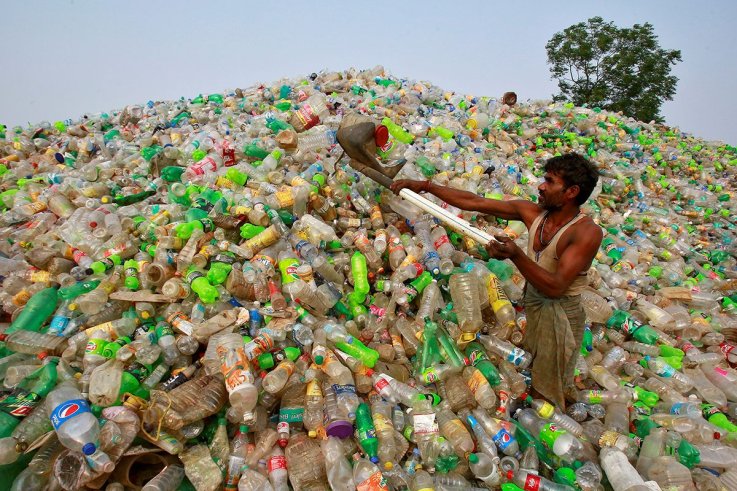World Environment Day 2018: Shocking Photos of the Plastic Waste Choking Our Planet

Globally, some eight million tonnes of plastic is dumped into the oceans every year, killing marine life and entering the human food chain, according to the U.N. Environment Programme.
This year's World Environment Day, a United Nations initiative that has run since 1972, hopes to draw attention to the problem. Taking place on Tuesday June 5, its theme is "Beat Plastic Pollution," and the U.N. is calling for the "biggest-ever worldwide cleanup" of plastic waste.
A new report by U.N. Environment has found an uptick in global efforts to tackle plastic pollution. Government levies and bans have been among the most effective in curbing the reliance on single-use plastics, which make up 50 per cent of the plastic we use.
However, the report recognises the need for private businesses to step up in their efforts to stem the tides of plastic waste. Around the world, one million plastic drinking bottles are purchased every minute. Up to five trillion disposable plastic bags are used every year.
Greenpeace is campaigning to end the flow of plastic into our oceans. They are calling on big corporations to act to reduce their plastic footprint—and stop producing excessive plastic packaging that is designed to be used once then thrown away.
Plastic in the ocean damages coral reefs and marine wildlife. It can take up to 1,000 years for it to fully disintegrate.
Five Asian countries—China, Indonesia, the Philippines and Vietnam and Thailand—accounted for up to 60 percent of the plastic waste leaking into the ocean, according to a 2015 report by the environmental campaigner Ocean Conservancy and the McKinsey Center for Business and Environment.
The five economies have "generated exploding demand for consumer products," the report said, but lacked the waste management infrastructure to cope with the surge in plastic garbage.
In Thailand, where two million tonnes of plastic waste is produced a year, plastic is an "addiction," said Geoff Baker, an anti-plastic campaigner with Grin Green International.
The recent death of a pilot whale in Thailand with 80 pieces of plastic rubbish in its stomach garnered headlines locally, but drew more attention outside the country.
Anchalee Pipattanawattanakul, an ocean campaigner with Greenpeace in Southeast Asia, said the region needs a coordinated strategy on plastic waste.
"ASEAN says the problem needs to be addressed," she said, referring to the Association of Southeast Asian Nations. "But there is no action plan that will actually decrease the use of plastic".
Greenpeace has several suggestions of ways you can help reduce the amount of plastic in our oceans, including pressurizing supermarkets to reduce single-use plastics.
—Reuters contributed to this report.
